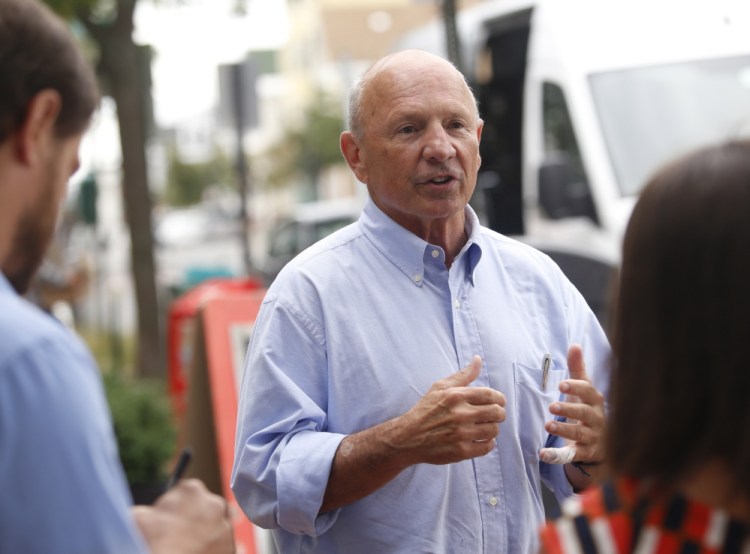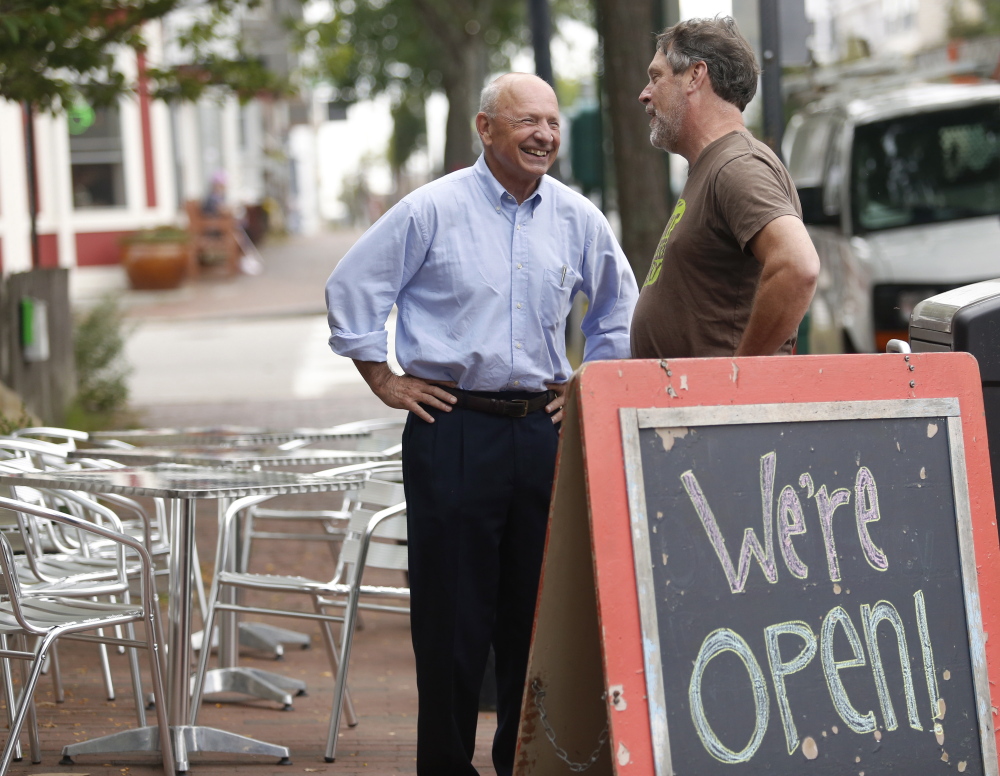Portland Mayor Michael Brennan deflected criticism of the City Council’s vote to create a citywide minimum wage, calling it a “historic” and “significant step forward” during a news conference Thursday on Munjoy Hill.
Brennan’s comments at Rosemont Market came as he and Democratic councilors are taking heat for reversing a decision to increase the base wage for tipped workers. Brennan’s political rivals, as well as progressive groups typically aligned with the mayor, believe tipped workers should have seen an increase.
Critics also lament that the city will not immediately establish an enforcement plan to ensure that employers are following the new rules, due to take effect Jan. 1.
Brennan first proposed creating a citywide minimum wage that is higher than the state’s rate of $7.50 an hour during his 2014 State of the City address. Getting the measure approved by the council, however, has been difficult. The proposal became bogged down in the council’s Finance Committee, and Wednesday night the council had to reconsider a previous vote that inadvertently increased the base wage for tipped workers, which will remain at half of the state minimum.
Starting Jan. 1, the city’s minimum wage will be $10.10 an hour. The next year it will increase to $10.68 an hour, and future increases will be tied to inflation.
While conceding that few, if any, workers in Portland make the state minimum, Brennan said a higher minimum wage will help solve the top complaint of local businesses – attracting and retaining skilled labor – and help residents afford living in the city, which is experiencing a significant increase in rents.
Brennan said, however, that an unknown number of workers do make less than $10.10 per hour and would benefit from the increase.
“By increasing the minimum wage, we’re making sure nobody is left behind,” the mayor said, highlighting the importance of tying future raises to inflation.
‘PEOPLE NEED TO BE PAID’
John Naylor, owner of Rosemont Market, supports the new minimum wage.
“We’re pretty much there at that minimum wage already,” Naylor said. “People need to be paid. This city really relies on the food industry. We need to have people working here in the food industry. We need to have people that are able to live in the city. In order to do that, they need to make more money.”
The council’s decision not to increase the base wage of tipped workers has drawn criticism from progressive groups such as the Maine Women’s Lobby, Maine People’s Alliance and the Portland Green Independent Committee. Those groups argue that excluding tipped workers disproportionately affects women, who they say make up 80 percent of the tipped labor workforce in Maine.
The Portland Greens are trying to raise the minimum wage in Portland to $15 an hour through a citywide referendum this fall, while the Maine People’s Alliance is pursuing a statewide increase through a 2016 referendum.
CANDIDATES REACT
MPA communications director Mike Tipping said in a statement that polling has shown that 67 percent of Portland voters supported increasing the wage for tipped workers.
“It’s unacceptable that those who serve food at restaurants can’t always afford to feed their own families and it’s lamentable that the council chose to deny them an increase in the sub-minimum tipped wage, even as some of the same councilors expressed support for increasing the tipped wage at the state level,” he said.
State Senate Democratic leader Justin Alfond said in a statement that Portland’s wage law is “providing an example for the rest of the state.” He added in a follow-up statement that tipped workers also deserve a raise.
“All minimum wage workers, including tipped employees, deserve a raise,” he said. “The minimum wage’s purchasing power has dropped significantly over time as it lagged behind inflation. While this ordinance leaves some work still to be done, that does not diminish its benefits – namely, more money in the pockets of many of Portland’s low-wage workers. That’s money they’ll spend in the local economy, save or invest in their future. We can’t let the perfect be the enemy of the good.”
Brennan is seeking another four-year term as mayor. He is being challenged by former state lawmaker Ethan Strimling and Portland Green Independent Committee Chairman Tom MacMillan.
The minimum wage ordinance likely will emerge as a campaign issue for all three candidates.
“I support the council’s action to raise the minimum wage to $10.10 with indexing, but am disappointed that tipped workers did not get some kind of raise,” Strimling said in an email. He did not respond to follow-up questions about enforcement and whether he supports the Greens’ effort to raise the wage to $15 an hour.
MacMillan, who supports increasing the wage to $15 an hour, was more forceful in his criticism. He said the council vote shows that local Democrats are beholden to restaurant owners, who play an important role in Portland’s tourism industry. Only Councilors David Marshall and Kevin Donoghue – both Greens – opposed eliminating the raise for tipped workers.
“They showed why we need alternative candidates,” MacMillan said. “The Democrats on the council folded under the least bit of pressure from the restaurant association. They gave up the actual benefit to most people.”
‘IT GIVES PEOPLE FALSE HOPE’
While restaurant owners argued that tipped workers make $20 an hour or more, MacMillan said that data from the U.S. Bureau of Labor Statistics shows the median wage for tipped workers in Greater Portland is about $9 an hour.
Brennan said that if tipped workers don’t make the new minimum wage after tips, employers are required to make up the difference. However, the city has no immediate plans to hire someone to enforce the ordinance, leaving it up to workers to file a lawsuit against their employers.
City Manager Jon Jennings said in a memo to councilors that it would cost roughly $100,000 to hire someone to enforce the ordinance and set aside a legal fund. Jennings said the city will wait and see how many complaints it receives before moving forward with an enforcement plan.
“If we’re receiving a significant number of complaints in the first quarter of next year, we would move immediately to bring someone on board,” Jennings said Thursday.
Although the ordinance allows workers to collect legal fees if they prevail in court, MacMillan doubts that workers will go through the trouble and risk losing their jobs.
“Bosses are left in complete control with this ordinance,” he said. “Creating a law that isn’t going to be enforced is meaningless. It gives people false hope.”
While Greens are asking Portland residents to adopt a $15-an-hour wage in November, Brennan said his proposal was carefully crafted to fit Portland’s economic climate, rather than simply joining a national movement. He noted that his wage proposal is in line with a recent report that indicated that minimum wages that are set at 60 percent of the median income are the most successful.
“We’ve, I think, hit the spot where people are going to get an increase in pay without it resulting in any job loss or any adverse effect on businesses,” Brennan said.
Send questions/comments to the editors.






Success. Please wait for the page to reload. If the page does not reload within 5 seconds, please refresh the page.
Enter your email and password to access comments.
Hi, to comment on stories you must . This profile is in addition to your subscription and website login.
Already have a commenting profile? .
Invalid username/password.
Please check your email to confirm and complete your registration.
Only subscribers are eligible to post comments. Please subscribe or login first for digital access. Here’s why.
Use the form below to reset your password. When you've submitted your account email, we will send an email with a reset code.